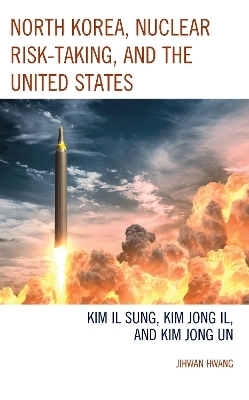
North Korea, Nuclear Risk-Taking, and the United States
Kim Il Sung, Kim Jong Il, and Kim Jong Un
Seiten
2023
Lexington Books (Verlag)
978-1-7936-5026-9 (ISBN)
Lexington Books (Verlag)
978-1-7936-5026-9 (ISBN)
This book analyzes Pyongyang’s nuclear policy changes for the last three decades under Kim Il Sung, Kim Jong Il and Kim Jong Un. It explains when and why the North Korean leaders have chosen either risk-acceptant confrontation or risk-averse engagement toward the United States.
Jihwan Hwang analyzes Pyongyang’s nuclear policy changes over the last three decades under Kim Il Sung, Kim Jong Il and Kim Jong Un. Why did a weaker North Korea take the risk of standing up against the much stronger U.S. with its nuclear weapons program, even escalating the crisis to the point of a war? Later, why did North Korea change its course of action amid the crisis even though the security environment remained essentially the same? Hwang draws on the main tenets of prospect theory in international relations and argues that Pyongyang becomes either risk-acceptant or risk-averse toward the U.S., depending on the situation it faces. When Pyongyang perceived the status quo to be deteriorating, it framed its situation as a loss and chose a risk-acceptant of confrontation to restore the status quo. Equally, when Pyongyang perceived the situation to be improving, it chose a risk-averse engagement in the domain of gain. In contrast, when Pyongyang perceived an extreme loss such as military confrontation against the United States, it would rather choose a risk-averse policy to avoid the catastrophic outcome of war. The issues of risk are central to an understanding of Pyongyang’s nuclear policy decision-making.
Jihwan Hwang analyzes Pyongyang’s nuclear policy changes over the last three decades under Kim Il Sung, Kim Jong Il and Kim Jong Un. Why did a weaker North Korea take the risk of standing up against the much stronger U.S. with its nuclear weapons program, even escalating the crisis to the point of a war? Later, why did North Korea change its course of action amid the crisis even though the security environment remained essentially the same? Hwang draws on the main tenets of prospect theory in international relations and argues that Pyongyang becomes either risk-acceptant or risk-averse toward the U.S., depending on the situation it faces. When Pyongyang perceived the status quo to be deteriorating, it framed its situation as a loss and chose a risk-acceptant of confrontation to restore the status quo. Equally, when Pyongyang perceived the situation to be improving, it chose a risk-averse engagement in the domain of gain. In contrast, when Pyongyang perceived an extreme loss such as military confrontation against the United States, it would rather choose a risk-averse policy to avoid the catastrophic outcome of war. The issues of risk are central to an understanding of Pyongyang’s nuclear policy decision-making.
Jihwan Hwang is professor of International Relations at the University of Seoul, Korea.
Introduction
Chapter 1: Realism and Liberalism on the North Korean Nuclear Crisis
Chapter 2: Theorizing the North Korean Nuclear Risk-Taking: Prospect Theory
Chapter 3: Kim Il Sung: From Confrontation to Engagement
Chapter 4: Kim Jong Il: From Engagement to Confrontation
Chapter 5: Kim Jong Un: Between Confrontation and Engagement
Conclusion
| Erscheinungsdatum | 09.11.2023 |
|---|---|
| Reihe/Serie | Lexington Studies on Korea's Place in International Relations |
| Verlagsort | Lanham, MD |
| Sprache | englisch |
| Maße | 157 x 236 mm |
| Gewicht | 517 g |
| Themenwelt | Sozialwissenschaften ► Politik / Verwaltung ► Staat / Verwaltung |
| ISBN-10 | 1-7936-5026-8 / 1793650268 |
| ISBN-13 | 978-1-7936-5026-9 / 9781793650269 |
| Zustand | Neuware |
| Haben Sie eine Frage zum Produkt? |
Mehr entdecken
aus dem Bereich
aus dem Bereich
Organisationen steuern, Strukturen schaffen, Prozesse gestalten
Buch | Softcover (2024)
Rehm Verlag
38,00 €


